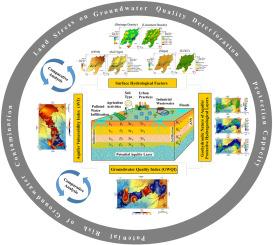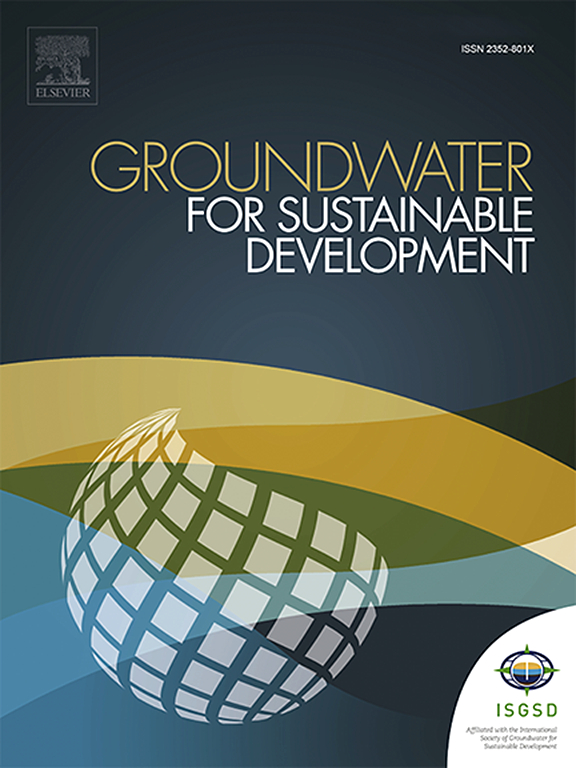Presenting a transdisciplinary robust approach for comprehensive assessment of large-scale underground water resources in western Indo-Gangetic Basin
IF 4.9
Q2 ENGINEERING, ENVIRONMENTAL
引用次数: 0
Abstract
Overexploitation, pollution, and anthropogenic activities threaten the sustainability of groundwater resources in the western Indo-Gangetic Basin. Meanwhile, distinguishing regions prone to contamination and understanding the natural and anthropogenic factors affecting groundwater quality is challenging due to the heterogeneous nature of aquifer systems and the lack of high-resolution spatial and temporal data on aquifer protective hydrogeological layers. This study presents a transdisciplinary robust approach combining regional electrical resistivity surveys, hydrogeological data, physicochemical analyses, and geospatial datasets to identify regions prone to contamination and understand the impacts of natural and anthropogenic factors on groundwater resources. This approach involves three key steps: evaluating the geohydraulic nature of aquifer protective hydrogeological layers, mapping the aquifer vulnerability index (AVI), and conducting comparative analyses of potentially vulnerable areas with groundwater quality index (GWQI) and hydrological factors. Firstly, model-based inversion of ID Vertical Electrical Sounding (VES) data provides insights into geoelectrical indices such as depth, thickness, apparent resistivity, longitudinal conductance, transverse resistance, and longitudinal resistivity of aquifer protective hydrogeological layers. Second, the Artificial Neural Network (ANN) model is used as a multilayer perceptron network to simulate hydraulic conductivity (K) using geoelectrical indices of aquifer protective hydrogeological layers. Subsequently, by considering ANN-derived K and VES-derived h of aquifer protective hydrogeological layers, the dynamic hydraulic resistance to the vertical flow of wastewater through the protective hydrogeological layers evaluated the index of the potentially vulnerable areas. Comparative analyses of potentially vulnerable areas with GWQI and hydrological factors (e.g., digital elevation model, soil, drainage density, lineament density, slope) enhance understanding regions prone to contaminants and land surface stress. Findings show that the ANN approach to simulate K, reducing effort with costs associated with slug testing is significant for AVI assessment. Furthermore, the geohydraulic characteristics, vulnerability indexing, and comparative analyses assist in identifying contamination-prone areas, improving groundwater resource protection and exploration activities.

提出一种跨学科的稳健方法,用于全面评估印度洋-甘地盆地西部的大规模地下水资源
过度开采、污染和人为活动威胁着印度洋-甘地盆地西部地下水资源的可持续性。同时,由于含水层系统的异质性,以及缺乏含水层保护水文地质层的高分辨率时空数据,要区分易受污染的区域并了解影响地下水质量的自然和人为因素具有挑战性。本研究提出了一种结合区域电阻率测量、水文地质数据、物理化学分析和地理空间数据集的跨学科稳健方法,以确定易受污染的区域,并了解自然和人为因素对地下水资源的影响。这种方法包括三个关键步骤:评估含水层保护水文地质层的地质水文性质、绘制含水层脆弱性指数(AVI)图,以及对潜在脆弱区域与地下水质量指数(GWQI)和水文因素进行比较分析。首先,通过基于模型的 ID 垂直电探测(VES)数据反演,可以了解含水层保护水文地质层的深度、厚度、视电阻率、纵向电导率、横向电阻率和纵向电阻率等地质电学指数。其次,将人工神经网络(ANN)模型作为多层感知器网络,利用含水层保护水文地质层的地质电学指标模拟水力传导率(K)。随后,通过考虑 ANN 导出的 K 和 VES 导出的含水层保护水文地质层 h,评估了废水流经保护水文地质层时垂直流动的动态水力阻力,从而评估了潜在易受影响地区的指数。将潜在脆弱区域与 GWQI 和水文因素(如数字高程模型、土壤、排水密度、线状密度、坡度)进行比较分析,可加深对易受污染物和地表压力影响区域的了解。研究结果表明,用 ANN 方法模拟 K,减少了与弹头测试相关的工作量和成本,对 AVI 评估意义重大。此外,地质水文特征、脆弱性指数和比较分析有助于确定易受污染地区,改善地下水资源保护和勘探活动。
本文章由计算机程序翻译,如有差异,请以英文原文为准。
求助全文
约1分钟内获得全文
求助全文
来源期刊

Groundwater for Sustainable Development
Social Sciences-Geography, Planning and Development
CiteScore
11.50
自引率
10.20%
发文量
152
期刊介绍:
Groundwater for Sustainable Development is directed to different stakeholders and professionals, including government and non-governmental organizations, international funding agencies, universities, public water institutions, public health and other public/private sector professionals, and other relevant institutions. It is aimed at professionals, academics and students in the fields of disciplines such as: groundwater and its connection to surface hydrology and environment, soil sciences, engineering, ecology, microbiology, atmospheric sciences, analytical chemistry, hydro-engineering, water technology, environmental ethics, economics, public health, policy, as well as social sciences, legal disciplines, or any other area connected with water issues. The objectives of this journal are to facilitate: • The improvement of effective and sustainable management of water resources across the globe. • The improvement of human access to groundwater resources in adequate quantity and good quality. • The meeting of the increasing demand for drinking and irrigation water needed for food security to contribute to a social and economically sound human development. • The creation of a global inter- and multidisciplinary platform and forum to improve our understanding of groundwater resources and to advocate their effective and sustainable management and protection against contamination. • Interdisciplinary information exchange and to stimulate scientific research in the fields of groundwater related sciences and social and health sciences required to achieve the United Nations Millennium Development Goals for sustainable development.
 求助内容:
求助内容: 应助结果提醒方式:
应助结果提醒方式:


